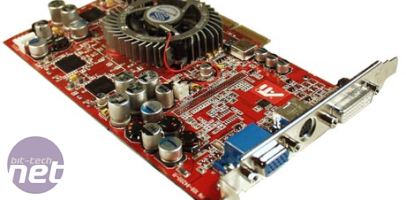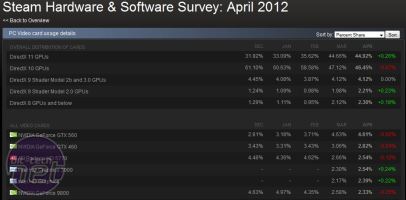How old is your hardware?
May 22, 2012 | 07:31

Something that's fascinated me since I became a PC enthusiast in the 1990s is the economy surrounding the hardware industry. It’s incredibly disjointed in some ways, and heavily reliant on other segments of itself in others. For instance, software, such as games or new operating systems, can dramatically drive forward new generations of hardware kit. [break]
On the flip-side, hardware can drive itself forward, with one release spawning other releases. CPUs and motherboards are the classic example, and we’re seeing the exact same thing with Intel’s latest Ivy Bridge CPUs and motherboards equipped with the Z77 chipset. We all want the latest hardware of course. It provides better frame rates, sexier visuals,or in the case of PSUs, can even save money on your electricity bill.
However, while our industry relies on new hardware and people’s willingness or need to buy it, there are plenty of people out there that are quite happy with seriously old kit. We’re not talking about a generation or two out of date either. We’re talking about three or four generations old, and the hardware was never particularly impressive when it was new either. Some of the graphics cards are barely DirectX 9 compatible, yet these people are keen gamers.
ATI's Radeon 9700 Pro was a great graphics card in its day, but many gamers still use ancient hardware to play games.
Several people I know have only recently upgraded from graphics cards such as the ATI 9600 Pro (now AMD of course) or the Nvidia GeForce 6800 GT. An interesting look into just how many people are using quite aged hardware is the Steam Hardware and Software Survey. Currently updated as of April this year, and with numerous bug fixes that now tell a more accurate story of newer PCs, it shows some interesting facts about the PC gamers out there.
Nearly 10 per cent of those surveyed use DirectX 9 and below-capable graphics cards – a figure that’s roughly similar when it comes to single-core CPU usage too. The latter suggests quite a few people are still rocking with elderly Intel LGA775 and AMD Socket 939 systems – both of which were the turning points for the switch to dual core CPUs. Likewise, the Nvidia GeForce 8800 series is still massively popular and with a figure of just over 30 per cent attributed to ‘other’ for video card description, it’s likely this number is made of substantial numbers of even older graphics cards.
Steam, of course, is home to a wide variety of games. One explanation for the large numbers of old systems is that many games simply don’t need cutting edge hardware. 2D-based games are prime examples of where a half decent CPU is all that’s needed. This argument might go some way to explaining why some people are still using hardware that was already half a decade old when President Obama was victorious in the 2008 presidential election. However, I know from personal experience that many people simply play very old games, or are quite happy dropping the settings of more modern games to hideous levels in order to play them with acceptable frame rates.
They’re passionate gamers, and many must have the money to upgrade (after all, an upgrade from a 9600 Pro can probably be had for half the cost of a tank of petrol these days, even less second hand). Maybe they're console gamers first, PC gamers second? There are some other more promising facts in the survey though. Windows 7 64-bit is now by far the most common operating system, and Windows XP is more popular than Windows Vista (even Microsoft admitted it wasn’t a great OS). This is a clear sign that gamers are at least buying new PCs or opting for Microsoft's new operating system.
The Steam Hardware and Software survey makes for some fascinating reading into what kind of PCs are out there and what the most popular hardware is.
More importantly, the most popular graphics cards are now those from the GeForce GTX 560 series, undoubtedly due to the serious price drops the series has had thanks to new hardware launches, while Intel HD Graphics 3000 are close behind. The latter might make you cringe to think of all the poor souls out there using what is essentially integrated graphics for games, but don’t forget that the HD 3000 series means they’re also sporting a very modern Intel CPU, which is all you need to play some of the simpler, less graphically-demanding games on Steam.
Game graphics comparisons such as this Battefield 3 one clearly show just how much better the game looks at high settings. Clearly there may be many reasons why someone might not have modern-enough hardware in their PC to play games at high settings, and after all, many people would say it's better to play the game, even at low settings than to not play it at all.
For me it’s an alien concept not to want great graphics though. It’s half the joy of buying and playing a new game, especially one that’s had thousands of man hours put into the visuals as well as the actual gameplay such as those in the Crysis or Battlefield series'. I’ve even held off playing new games in the past, just so I could save up to get the hardware needed to play them at decent settings. For that reason, the core hardware in my PC is rarely older than two to three years, although I'm quite happy to relent and drop in mid-range hardware and not pay a small fortune on the latest must-have gear. I also upgrade because other tasks I use my PC for such as photo editing, would see improvements too, so upgrading isn't just a game-related urge.
I’d be genuinely interested to know how old your hardware is, how often you upgrade and if you or anyone you know has some seriously old gear kicking around and what games they actually play. Let us know in the comments.
On the flip-side, hardware can drive itself forward, with one release spawning other releases. CPUs and motherboards are the classic example, and we’re seeing the exact same thing with Intel’s latest Ivy Bridge CPUs and motherboards equipped with the Z77 chipset. We all want the latest hardware of course. It provides better frame rates, sexier visuals,or in the case of PSUs, can even save money on your electricity bill.
However, while our industry relies on new hardware and people’s willingness or need to buy it, there are plenty of people out there that are quite happy with seriously old kit. We’re not talking about a generation or two out of date either. We’re talking about three or four generations old, and the hardware was never particularly impressive when it was new either. Some of the graphics cards are barely DirectX 9 compatible, yet these people are keen gamers.
ATI's Radeon 9700 Pro was a great graphics card in its day, but many gamers still use ancient hardware to play games.
Several people I know have only recently upgraded from graphics cards such as the ATI 9600 Pro (now AMD of course) or the Nvidia GeForce 6800 GT. An interesting look into just how many people are using quite aged hardware is the Steam Hardware and Software Survey. Currently updated as of April this year, and with numerous bug fixes that now tell a more accurate story of newer PCs, it shows some interesting facts about the PC gamers out there.
Nearly 10 per cent of those surveyed use DirectX 9 and below-capable graphics cards – a figure that’s roughly similar when it comes to single-core CPU usage too. The latter suggests quite a few people are still rocking with elderly Intel LGA775 and AMD Socket 939 systems – both of which were the turning points for the switch to dual core CPUs. Likewise, the Nvidia GeForce 8800 series is still massively popular and with a figure of just over 30 per cent attributed to ‘other’ for video card description, it’s likely this number is made of substantial numbers of even older graphics cards.
Steam, of course, is home to a wide variety of games. One explanation for the large numbers of old systems is that many games simply don’t need cutting edge hardware. 2D-based games are prime examples of where a half decent CPU is all that’s needed. This argument might go some way to explaining why some people are still using hardware that was already half a decade old when President Obama was victorious in the 2008 presidential election. However, I know from personal experience that many people simply play very old games, or are quite happy dropping the settings of more modern games to hideous levels in order to play them with acceptable frame rates.
They’re passionate gamers, and many must have the money to upgrade (after all, an upgrade from a 9600 Pro can probably be had for half the cost of a tank of petrol these days, even less second hand). Maybe they're console gamers first, PC gamers second? There are some other more promising facts in the survey though. Windows 7 64-bit is now by far the most common operating system, and Windows XP is more popular than Windows Vista (even Microsoft admitted it wasn’t a great OS). This is a clear sign that gamers are at least buying new PCs or opting for Microsoft's new operating system.
The Steam Hardware and Software survey makes for some fascinating reading into what kind of PCs are out there and what the most popular hardware is.
More importantly, the most popular graphics cards are now those from the GeForce GTX 560 series, undoubtedly due to the serious price drops the series has had thanks to new hardware launches, while Intel HD Graphics 3000 are close behind. The latter might make you cringe to think of all the poor souls out there using what is essentially integrated graphics for games, but don’t forget that the HD 3000 series means they’re also sporting a very modern Intel CPU, which is all you need to play some of the simpler, less graphically-demanding games on Steam.
Game graphics comparisons such as this Battefield 3 one clearly show just how much better the game looks at high settings. Clearly there may be many reasons why someone might not have modern-enough hardware in their PC to play games at high settings, and after all, many people would say it's better to play the game, even at low settings than to not play it at all.
For me it’s an alien concept not to want great graphics though. It’s half the joy of buying and playing a new game, especially one that’s had thousands of man hours put into the visuals as well as the actual gameplay such as those in the Crysis or Battlefield series'. I’ve even held off playing new games in the past, just so I could save up to get the hardware needed to play them at decent settings. For that reason, the core hardware in my PC is rarely older than two to three years, although I'm quite happy to relent and drop in mid-range hardware and not pay a small fortune on the latest must-have gear. I also upgrade because other tasks I use my PC for such as photo editing, would see improvements too, so upgrading isn't just a game-related urge.
I’d be genuinely interested to know how old your hardware is, how often you upgrade and if you or anyone you know has some seriously old gear kicking around and what games they actually play. Let us know in the comments.

MSI MPG Velox 100R Chassis Review
October 14 2021 | 15:04








Want to comment? Please log in.